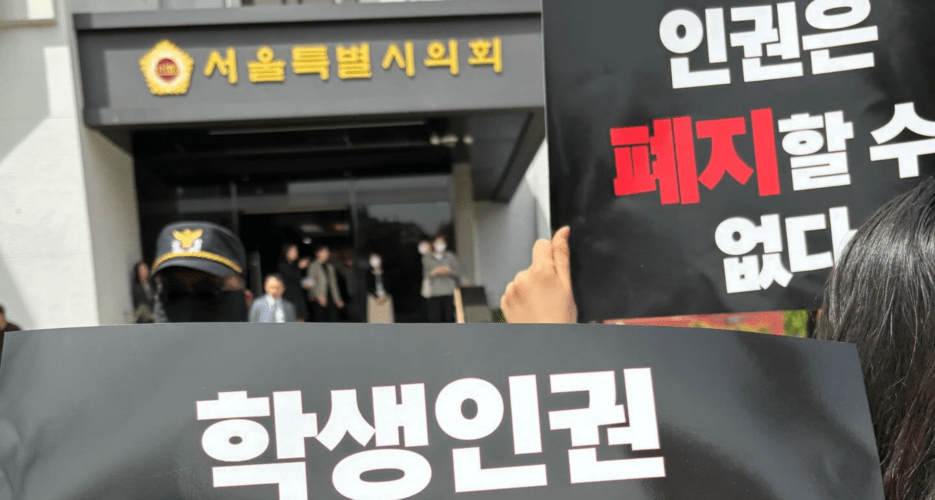|
Analysis Seoul’s repeal of student rights ordinance sparks debate over balance of powerExperts warn of weakened student protections and reversed progress, while critics argue for teachers’ authority Lina ParkMay 9, 2024  The National Youth-Citizen Action for Student Rights group holds an urgent press conference in front of the Seoul Metropolitan Council, demanding to stop the attempted abolition of the Seoul Student Rights Ordinance, April 26, 2024 | Image: National Youth-Citizen Action for Student Rights The Seoul Metropolitan Council’s decision to repeal the Seoul Student Human Rights Ordinance has reignited debate over the balance between student rights and educators’ authority. Additionally, the repeal risks weakening student rights and reversing progress in recognizing and protecting students’ fundamental human rights. The ordinance, introduced a decade ago to prevent discrimination based on factors such as academic performance, enhanced student rights by protecting against discrimination and violence and promoting the right to an education tailored to individual abilities. However, critics argue that the ordinance weakened teachers’ authority and infringed on other students’ rights to education by overemphasizing individual student rights. The repeal has sparked discussions on the appropriate extent of student rights, the role of educators and potential legislative adjustments needed to address the evolving nature of student-teacher dynamics. RISE AND FALL Gyeonggi Province first enacted the Student Human Rights Ordinance in 2010. Gwangju followed in 2011 and Seoul in 2012. However, in some instances, such as in South Gyeongsang Province, the enactment failed due to opposition from religious groups and conservative parent organizations. The Constitutional Court ruled in 2019 that the ordinance aligned with the ROK Constitution, making it applicable nationwide. Despite this ruling, the South Chungcheong Provincial Assembly repealed its provincial student rights ordinance in Dec. 2023. All affirmative votes came from the province’s People Power Party (PPP) lawmakers, who have historically opposed the ordinance, claiming it promotes homosexuality, infringes upon students’ learning rights and potentially harms students. The Seoul Metropolitan Council followed suit on April 26. The city’s council chairman had proposed the bill the previous month in response to a petition from the Seoul Metropolitan Student Rights Ordinance Abolition Citizens’ Alliance, a coalition of religious and parent groups. All of the council’s PPP members voted in favor of the motion, while Democratic Party of Korea members who opposed it abstained from voting. This marked the second instance of the ordinance being repealed 12 years after its enactment. Meanwhile, Gwangju City Council stated that it received a petition signed by more than 10,000 people calling for the abolition of the city’s student rights ordinance.  Groups urging the abolition of the Seoul Student Rights Ordinance hold a rally in front of the Seoul Metropolitan Council, April 26, 2024 | Image: National Coalition for a Healthy Society EXCESSIVE RIGHTS Other groups like the National Alliance to Oppose Homosexuality and the Amendment of the Constitution for Same-Sex Marriage also supported the ordinance’s abolition. The organization criticized the student rights ordinance, arguing that the ordinance resulted in the “excessive protection of student rights” and undermined teachers’ authority. They claim that the ordinance, which guarantees students’ right to rest, resulted in teachers allowing students to take breaks during class time, contributing to a “decline in basic academic skills.” The group also argued that the ordinance promoted sexual misconduct by conducting sex rights education, which they claim misled students into believing they have the right to engage in sexual activities. Additionally, the group criticized the ordinance for prohibiting teachers from inspecting students’ personal belongings under the guise of protecting students’ privacy, which the group claims prevented the detection of weapons or drugs, thereby posing “numerous problems.”  Cho Hee-yeon, the Seoul Metropolitan Office of Education superintendent, protests in front of the Seoul Metropolitan Office of Education after the unilateral passage of the student rights abolition bill, April 26, 2024 | Image: Cho Hee-yeon EXPERT PUSHBACK Sung Ki-sun, an education professor at the Catholic University of Korea and former director of the Korea Institute for Curriculum and Evaluation, discussed the controversies surrounding the Student Human Rights Ordinance with Korea Pro. He pointed out that conservative Christian groups have particularly taken issue with the ordinance’s provisions that recognize the rights of sexual minorities and gender identity, which they “exaggerate to claim as problematic.” The expert told Korea Pro that the debate intensified after a 23-year-old teacher at Seo-i Elementary School committed suicide last year as some critics argued that the ordinance infringed on teachers’ rights. However, Sung emphasized the need for balance, stating, “Both student rights and teachers’ rights to educate are equally important and should be harmoniously balanced.” He rejected the notion that the ordinance was the principal cause of such issues, noting that this claim “is not accepted in practice.” The Seoul Metropolitan Office of Education also voiced its opposition to abolishing the ordinance, stating that four laws protecting teachers were passed following the teacher’s death last year. Cho Hee-yeon, the Seoul Metropolitan Office of Education superintendent, stated that while the current measures to protect teachers are still insufficient, various strategies are being implemented. He argued that repealing the Student Human Rights Ordinance under the guise of protecting teachers would harm the teaching community by defining the rights between teachers and students as adversarial. Cho met with reporters immediately after the Seoul Metropolitan Council repealed the ordinance to express his disappointment, describing it as “a significant setback for the rights of students and citizens.”  The National Youth-Citizen Action for Student Rights group holds an urgent press conference in front of the Seoul Metropolitan Council, demanding to stop the attempted abolition of the Seoul Student Rights Ordinance, April 26, 2024 | Image: National Youth-Citizen Action for Student Rights IMPORTANCE OF STUDENT RIGHTS On Monday, Song Du-hwan, the chairman of the National Human Rights Commission of Korea, pointed out that in 2021, South Korea ranked last among Organization for Economic Co-operation and Development countries in terms of children’s happiness. According to the Human Rights Commission’s statistics, more than 4,000 complaints about human rights violations in schools were filed with the commission between 2018 and 2022. Sung from the Catholic University of Korea told Korea Pro that in the 1980s, students faced restrictions on their freedom of expression, including regulations on hair length, skirt length, and even stocking color under the guise of being “appropriate for students.” These restrictions forced students to think only within a fixed framework, according to Sung. Sung emphasized that respecting and protecting students’ rights is a critical goal of education. “Anyone who went to school in South Korea back in the old days would vividly recall when schools overlooked student rights. Back then, it would have been unthinkable to even discuss human rights or guaranteeing students their right to privacy,” Sung said. “No parent would want their child subjected to such treatment today.” Sung stressed that “the basic rights of students are part of the fundamental human rights that every person should enjoy and should not be suspended just because they are students.” He highlighted the ordinance’s role in cultivating a culture and regulatory framework that seeks to protect these rights, albeit imperfectly. Sung expressed concern over recent attempts to repeal the ordinance, attributing these efforts to a “misconception that protecting students’ rights is a primary cause of infringing on teachers’ authority.” He argued that such moves represent “a step backward in time,” advocating for the preservation of the ordinance to continue supporting students’ civil liberties within the educational system. “Ensuring the rights of students and teachers can be mutually beneficial. It’s not a zero-sum game where protecting one group’s rights inherently infringes on the other’s,” Sung told Korea Pro. Edited by John Lee The Seoul Metropolitan Council’s decision to repeal the Seoul Student Human Rights Ordinance has reignited debate over the balance between student rights and educators’ authority. Additionally, the repeal risks weakening student rights and reversing progress in recognizing and protecting students’ fundamental human rights. The ordinance, introduced a decade ago to prevent discrimination based on factors such as academic performance, enhanced student rights by protecting against discrimination and violence and promoting the right to an education tailored to individual abilities. Get your
|
|
Analysis Seoul’s repeal of student rights ordinance sparks debate over balance of powerExperts warn of weakened student protections and reversed progress, while critics argue for teachers’ authority  The Seoul Metropolitan Council’s decision to repeal the Seoul Student Human Rights Ordinance has reignited debate over the balance between student rights and educators’ authority. Additionally, the repeal risks weakening student rights and reversing progress in recognizing and protecting students’ fundamental human rights. The ordinance, introduced a decade ago to prevent discrimination based on factors such as academic performance, enhanced student rights by protecting against discrimination and violence and promoting the right to an education tailored to individual abilities. © Korea Risk Group. All rights reserved. |











